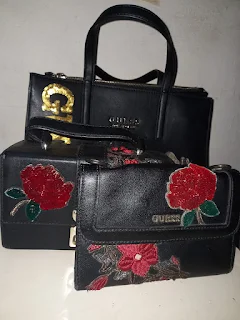5 Financial mistakes to avoid while spending
Hello Storytime readers, it has been a while since I wrote a financial advice post. I do not know why I don't write these more often when I am an expert at surviving. I mean I survived Bouta, an economical crisis, a pandemic, and a pile of debt Suriname's politicians acquired without us actually noticing where those 4 billion dollars went. I am talking united stated dollars here, you think we'd have a train by now. It was supposed to be running since the 25th of May 2015, for a price of one Surinamese dollar you would be able to ride the train. Now we don't have a train, but we do have bad roads and expensive gas prices thanks to the devaluation of the Surinamese dollars. And the ironic part is the country is rich in natural resources like oil, gold, diamonds, and other valuable minerals. But despite all of the challenges Suriname has faced it still has a lot of wonderful things to offer. When I first started this blog, one US dollar was worth 2,80 Surinamese dollars. Now one United States Dollar is worth 24,50 Surinamese dollars. As a millennial growing up during a country's financial crisis teaches you a thing or two. My survival skills have been put to the test and I had to learn the hard way. The good part is because of it I have discovered some awesome hidden skills that even I didn't know I had. Yes playing with your money can teach you a lot about yourself. Because your money influences your lifestyle and how you spend it says a lot about your lifestyle. It doesn't matter what country you are from, but I am sure you can relate to being a victim of bad leadership at one point in your life. This can even be true in working situations. The important thing is that we know it is important to be prepared through misfortunate events that we have no control over. There are certain actions and habits that we can adopt to secure the future. A secure future in a financial aspect must be the basis of 'quality of life. Quality of life should be a basic right for every human being. To ensure this financial future can be manifested here are 5 financial mistakes one should avoid while spending money:
1. Not knowing where your cents are spent
This is a rookie mistake that I made for years. I regret not keeping track of my cents at an earlier age. The financial insight that you can gain from knowing where you spend your cents reflects your lifestyle and the lifestyle choices you make. For example, it is because I started to keep track of my cents that I knew that I spent way too much money on cookies and snacks. For me, it was a hint to adopt a healthier lifestyle and better eating habits. Especially if it turns out that 36 % of your income went to junk food at the end of the year. Yikes, that's just an example that I am giving. Everyone has their own vices and bad habits. Keeping track of your finances makes you aware of how bad it is and if you can control it or not. It also helps you straighten out your priorities to meet your financial goals. If you want to buy something because it will be an asset, the less you spend on liabilities the faster you will get there. You can use applications that help you keep track of your money. These applications can be downloaded through the play store. Once you have such an app, you add your daily expenses to it. Most apps do an excellent job at giving you a proper overview of what percentage of your income goes to what. At the end of the year, you might be surprised by how quickly the numbers add up. If you have a clear overview of your money managing it becomes a lot easier. You might be surprised by the number of people who don't keep track of their expenses and are winging it blind. I am not judging, but unless you don't have an unlimited amount of money to spend it's better to play it on the safe side.
2. Not knowing the difference between a liability and an asset

When it comes to building some decent kind of financial knowledge you will find out why it is important to know the difference between a financial liability and an asset. A liability is something that will increase your expenses without you having any way of making money on it. Its presence causes a financial disadvantage to the owner. But an asset keeps holding its value. It can generate an income or help you generate income. Renting out real estate property for example is an asset. An example of a liability is any acquired debt or expenses that one has to endure. Now that you are keeping track of your expenses and that you know where your money is going you can divide your costs into these two areas. Write down what your liabilities and assets are. If you do not have any assets, the financial overview that you have gained from keeping track of your spending habits can help you generate more assets. Assets are necessary because they provide a value that can be transferred into cash. The liabilities that you have can be divided into necessary liabilities and unnecessary liabilities. That is the way I mostly do it. Junk food is an unnecessary liability but clothing and a roof over your head are necessary liabilities. Terminate as many unnecessary liabilities as you can. That way you can save more money to invest in assets that will give you long-term profits. The goal is to build multiple assets that can provide you with the lifestyle that you desire. And if you do happen to make a lot of money, make sure you put it to good use.
3. Splurging on impulsive deals
We all have those impulsive moments, but not being able to control impulsive buys can lead to unnecessary splurging. Especially if you aren't sitting on top of a mountain of money. If you have the kind of money where you don't care what you're going to spend in the next 50 years then all is well. But if you are still working towards achieving that financial dream it is better to avoid as many unnecessary impulsive buys as you can. I know it's alright to spoil yourself from time to time. But don't overdo it to an extent that your wallet will end up regretting it. For some people, it could be shoes, bags, food, clothes, or whatever rocks your boat. Too much, can be heavy on your pockets and set you back from achieving the goals that you have set for yourself. Marketing in stores and on social media is designed to trigger impulsive buying within the consumer. That's the point of sales. But don't get distracted by all the pretty things around you that you wish to buy. Ask yourself if it is really something that you need right now? If the answer is yes, go ahead and buy it. If the answer is no ask yourself how the money could be better spent? Take time to reflect on the purchase you want to make before you actually go through with buying it. Even I like spoiling myself, but they do say that there is a right time and a right place for everything for a reason. If you have nothing in your savings account to help you invest into assets that money saved can fit a better purpose. Once you have gathered enough assets that generate a satisfying income, you can loosen up on the shrewd spending habits. It is better to prepare for a rainy day since life consists of plenty of unexpected events. The goal is to become financially secure before you go crazy splurging. If you receive money today, it doesn't mean that you have to spend it all in one day.
4. Not taking the time to look for a better deal

5. Not knowing the value of the product you are purchasing
















Comments
Post a Comment